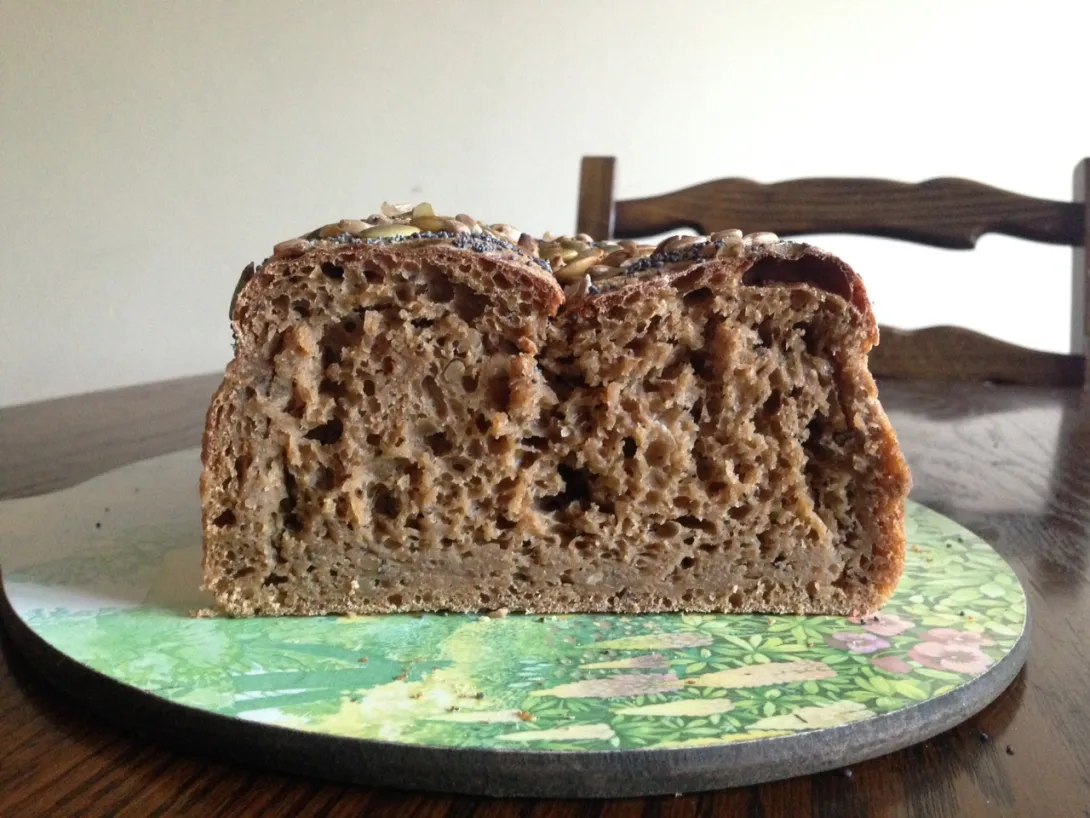
Hi everyone! Quite new to bread-making and would really appreciate some pointers. I'm trying to develop a recipe for an easy no-knead granary sandwich loaf that my mum can make but my latest attempt was a disaster. Although it tasted great, there was barely any oven-spring or rise and it came out sticky, wet and gummy, and with a dense streak near the bottom. I based it on Jim Lahey's no-knead bread, the basic version of which I have made before successfully. The other difference is that my mum wants to bake it in a tin rather than in a cloche so I do my final proof in a 4lb loaf tin, seam side down. The recipe I used for my attempt at granary was:
500g strong white bread flour
100g strong wholemeal bread flour
500g water
just over 1/4 tsp easy bake yeast
30g nut brown malt flour
5g diastatic malt powder
9g salt
25g mixture of seeds
12 hour bulk rise followed by shaping and another 12 hour cold proof. The loaf also looks a bit like it's collapsed where I scored it but that's from having to be a bit heavy-handed during slicing as it was so sticky even after cooling. I'm also fairly certain it's not under-baked as I ended up baking it for an hour because my thermometer probe kept coming out with wet dough stuck to it!
Looking at my recipe I suspect I used way too much water and too little yeast. I just realised I used 80% hydration (I don't normally go over 70% so I'm not sure how I calculated that I should add 500g) and the times I've had more success with no-knead bread I've actually had to use more yeast than Jim Lahey recommends.
I find it hard to judge if a dough is ready when it comes to high hydration doughs. My doughs just always seem very wet and sticky. Looking at the picture do you think as well as using too much water and too little yeast, that my dough was under proofed?
just buy a granary flour. I use Shipton Mill light malthouse and their Three malts & sunflower mixes.
Just one thing to note with these - the added "bits" in the flour affect what you might think is the right hydration - so use less water than you might calculate. I have found that these flours don't like being overly hydrated for long ferments too. Try weighing out 100g then sifting it... You might find some 10-15% of that 100g is not flour...
As for your current loaf - I think its over proofed and over hydrated @ 80% (and possibly under baked to boot even though you gave it an hour) - the gluten gave up and it sort of slumped. Weigh your yeast if you can too. I use 1.8g of dried yeast in a large loaf (530g wholemeal flour) for an overnight cool room ferment of about 10 hours.
My suggestion would be to go back to basics - ye olde 1 hour ferment (or until doubled) then another hour proof then bake - so you know you're portions/hydrations are OK, then start to reduce the yeast, extend the ferment/proof, etc.
-Gordon
Thanks for the tips Gordon. Totally appreciate a ready-blended flour might be simpler but because I've got the malt flour, diastatic malt powder and seeds for other bits and bobs I prefer to use them up instead. The flavour is fantastic so I think I got those proportions right but like you say maybe it's a case of going back to basics to work out hydration and proof times.